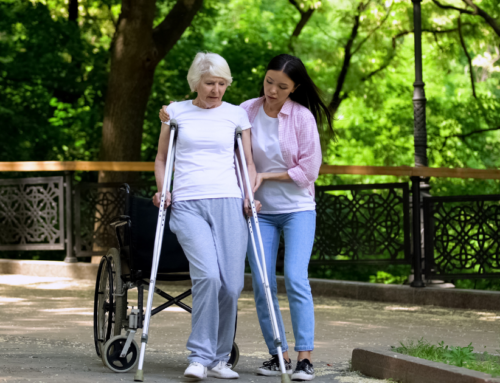How to Identify and Deal With Lewy Body Dementia—Part 2
Disclaimer: The following is for informational purposes only. New Wave Home Care does not recommend, encourage, or discourage the use of any medication or treatments. For diagnosis and treatment of Lewy body dementia, seek the aid of a qualified medical professional.
In part one of this article, we discussed what Lewy body dementia is, along with signs and symptoms. Now we’re going to discuss the current state of Lewy Body Dementia research, detection, treatment, and medication.
Lewy Body Dementia Research
A key part of Lewy Body Dementia research is determining how the manifestation of LBD is different from other neurodegenerative diseases, such as Alzheimer’s since the two appear similar in the early stages. The goal of researchers is to determine the components of, and differences between Alzheimer’s and LBD, so at earliest possible stages, the features of LBD can be identified. As researchers have discovered, there is a constellation of symptoms or features particular to LBD.
Is early detection possible?
No single test can diagnose Lewy body dementia. Instead, doctors diagnose your condition through ruling out other conditions that may cause similar signs and symptoms. Due to the fact that you can have Lewy body dementia before you know it, early detection is a relative term, and currently more in the providence of researchers.
That said, one possible means of early discovery is a simple, bedside test that can help spot underlying neurological disorders in people who have orthostatic hypotension (OH), which causes blood pressure to fall when they stand up. This occurs because the nerves that activate the squeezing of the blood vessels aren’t working correctly. This may result in dizziness or even fainting. OH can be caused by medications, anemia, or dehydration.
When OH is caused by a neurological disorder, such as LBD, it’s called neurogenic OH. Typically, physicians measure the change in blood pressure and heart rate between sitting and standing to determine whether OH is neurogenic or non-neurogenic. Early and accurate diagnosis of LBD may be aided by the detection of neurogenic OH.
Before you get an early start on depression, assuming you’ve been diagnosed with Lewy body dementia, keep in mind that medical knowledge has been expanding exponentially. Back in 1950, it was estimated that the body of medical knowledge doubled in 50 years. However, it accelerated to 7 years in 1980, 3.5 years in 2010, and according to studies, the body of medical knowledge is projected to double every 73 days by 2020. It follows that patients and caregivers should do whatever it takes to maintain themselves as researchers continue to seek cures. (There are suggestions below.)
Treatment
Since there’s no cure for Lewy body dementia, Doctors treat individual symptoms on a case-by-case basis.
Medications
The following information is quoted from the mayoclinic.org website:
Cholinesterase inhibitors: These Alzheimer’s disease medications, such as rivastigmine (Exelon), donepezil (Aricept) and galantamine (Razadyne), work by increasing the levels of chemical “messengers” in the brain (neurotransmitters), believed to be important for memory, thought, and judgment. This can help improve alertness and cognition and may help reduce hallucinations and other behavioral problems.
Possible side effects may include gastrointestinal upset, excessive salivation and tearing, and frequent urination. Donepezil is not approved by the Food and Drug Administration for Lewy body dementia. In some people with moderate or severe dementia, an N-methyl-d-aspartate (NMDA)-receptor antagonist called memantine (Namenda) may be added to the cholinesterase inhibitor.
Parkinson’s disease medications: These medications, such as carbidopa-levodopa (Sinemet, Rytary, Duopa) may help reduce Parkinsonian signs and symptoms, such as rigid muscles and slow movement. However, these medications may also increase confusion, hallucinations, and delusions.
Medications to treat other symptoms: Your doctor may prescribe medications to treat other signs and symptoms associated with Lewy body dementia, such as sleep or movement problems.
Medications to avoid
If possible, avoid medications with anticholinergic properties, which interfere with the passage of parasympathetic nerve impulses. Such medications can worsen cognition. Dopamine* agonists (drugs that counteract the effects of dopamine), which can cause hallucinations, should also be avoided.
First-generation antipsychotic medications, such as haloperidol (Haldol), should not be used to treat Lewy body dementia. They may cause severe confusion, severe parkinsonism, sedation, and sometimes even death. Very rarely, certain second-generation antipsychotics may be prescribed for a short time at a low dose but only if the benefits outweigh the risks.
*Dopamine is a neurotransmitter that helps to regulate movement and emotion. Its depletion may cause Parkinson’s disease
Therapies
Because antipsychotic drugs can worsen Lewy body dementia symptoms, it might be helpful to first try nondrug approaches, such as simply tolerating the behavior. Oftentimes, a person with Lewy body dementia isn’t distressed by the hallucinations. In such cases, the side effects of medication may be worse than the hallucinations themselves.
Alternative medicine
Frustration and anxiety can worsen dementia symptoms. These techniques may help promote relaxation:
- Music therapy; listening to soothing music
- Pet therapy, which involves the use of animals to improve moods and behaviors in dementia patient
- Aromatherapy, which is the use of fragrant plant oils
- Massage therapy
For more information, go to https://www.mayoclinic.org/diseases-conditions/lewy-body-dementia/diagnosis-treatment/drc-20352030



